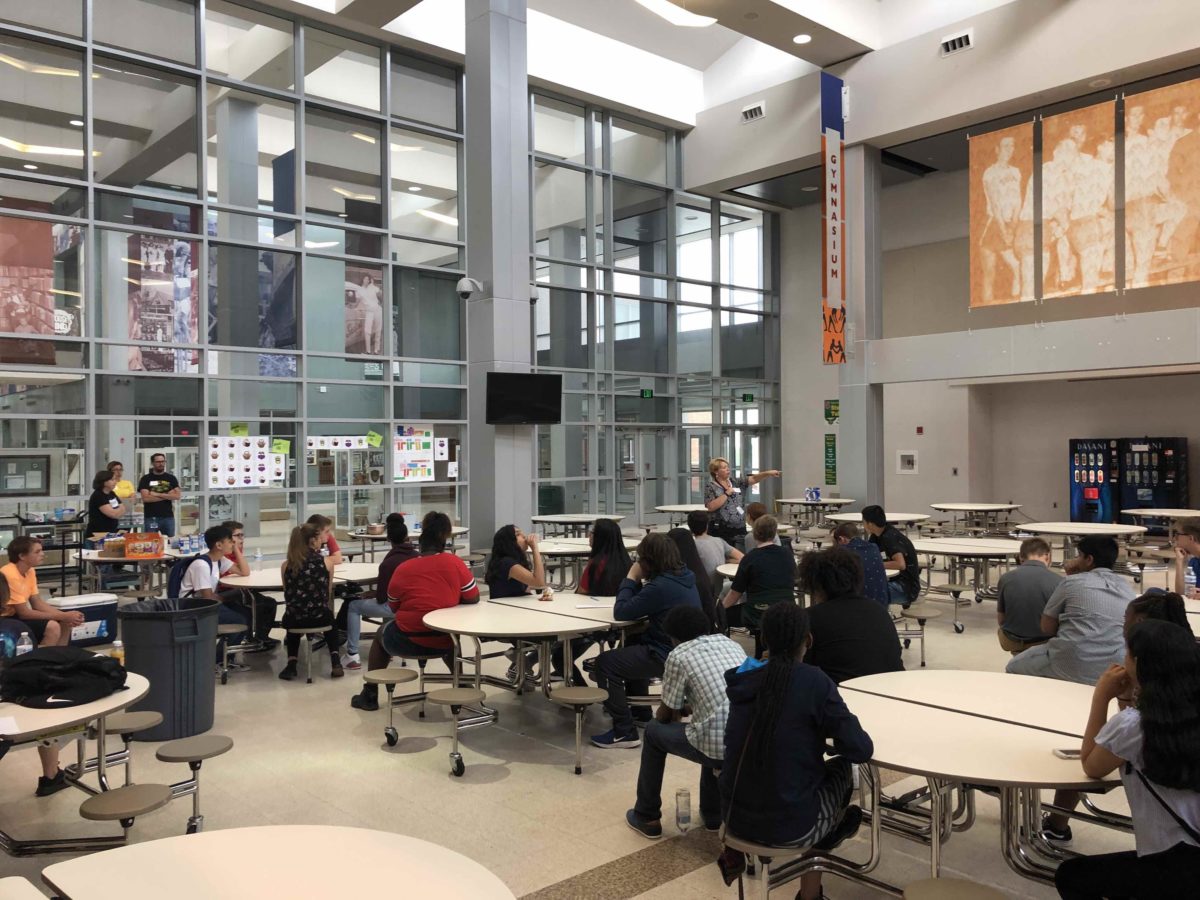At Dundalk High School last Tuesday morning, students held a wooden rod in their non-dominant hand and tried to stack metal nuts vertically. The trick was to hold the rod horizontally, so that the nuts wouldn’t slide off and knock down the stack.
This was one of multiple one-minute challenges at the beginning of the P-TECH Summer Institute, for incoming ninth-graders enrolled in a free program designed to blend high school, college and the professional world and prepare students for careers in engineering.
Xavier Conde, 13, said he likes hands-on projects and “building things out of basically nothing.”
Within six years, these students will have earned an associate degree for free, completed a six-week paid internship and sustained a mentorship relationship with a local tech professional.
This is Dundalk High School’s second cohort in P-TECH, which stands for Pathways in Technology Early College High School. Many students in the first cohort, now rising tenth graders, will take classes this summer at the Dundalk campus of the Community College of Baltimore County, which is across a parking lot from the high school. Those students will also attend an academic camp later this summer.
Students enrolled in P-TECH earn an associate degree in engineering technology for free from the Community College of Baltimore County. They complete a six-week paid internship and are paired with a private-sector mentor with whom they communicate regularly. Many students complete the program in four years; others take up to six. Graduates of the program are considered first in line when applying for jobs at these companies.
Conde joined because of the opportunity to get an associate degree for free before he graduates from high school. For someone who would be one of the first in his family to attend college, it was a tough opportunity to pass up. He said he enjoyed a project in middle school in which he built a tower out of uncooked pasta and marshmallows.
Abigail Urgiles, 14, said, “I chose it because it gives you a lot of opportunities.”
Classes ended for the year last Monday, so Amy Woolf, the high school’s P-TECH coordinator, said she wanted to have a fun day. For the rest of the week, the students visited the companies partnering with Dundalk High School: Alban CAT, KCI Technologies, Whiting-Turner and Stanley Black and Decker.
Other activities on Tuesday included bingo, a scavenger hunt and a cookie challenge. Students stick an open-faced Oreo on their forehead and have to move it to their mouth without using their hands.
What does that have to do with engineering?
“Absolutely nothing,” Woolf said. “But today is our team building day.”
The P-TECH model, in which high schools partner with community colleges and tech industry partners, began in Brooklyn in 2011 with partnership between IBM, CUNY’s City Tech and NYC’s education department. It expanded to other states and countries, including to Maryland, in 2016, at Dunbar High School and Carver Vocational-Technical School in Baltimore.

“Our goal is really to get students excited, get them a little preview of the hands-on aspects of technology,” said Douglas Handy, the Director of Career and Technology Education and Fine Arts for the Baltimore County Public Schools. “I would say every student has demonstrated some level of growth.”
“The first year went really, really well,” said Woolf, who oversees the program, recruits students, and handles some discipline. She says she’s the students’ “school mom.”
Woolf said the transition from middle school to high school offers “a chance to reinvent yourself.”
Part of the program’s curriculum, she said, is a class on effective learning habits.
“It’s teaching them how to be an effective student,” she said. “Getting them to think about who they are as a learner,” she said.
There is no test to get into the program. Handy said 60 students are in both cohorts, but a few dropped out last year. Of the first group, about two-thirds of the students were boys. About a third were Latinx, and a third were white. There were 12 Black students, 10 English learners and 10 students on individualized educational plans. He said about 25 were on the honor roll.
Woolf’s salary is the main cost of the program. There’s also room in the budget for snacks and other expenses.
“It does allow us to feed the kids,” she said.
Handy said students will complete their internships after their junior year, and that they will be paid a bit more than minimum wage.
James Deriu, the Vice President of Natural Resources at KCI Technologies, said in an email, “The opportunity to participate in a program like P-TECH was just too good for KCI to pass up.”
“We saw it as a great way to fill the STEM ‘pipeline’ in central Maryland and put real and tangible career and technical skills in the hands of students that may otherwise not have these opportunities,” Deriu stated. “Our senior leadership team has been behind this from the start and there has been a great interest from our technical staff to serve as mentors to P-TECH students.”
Deriu said he hopes the relationships students build with mentors will outlast the program.
A state bill was signed last month that will expand the program, of which Gov. Larry Hogan is a strong supporter, to three more schools around the state. The state awards $750 per student enrolled in the program to the local school district, which the district much match.







